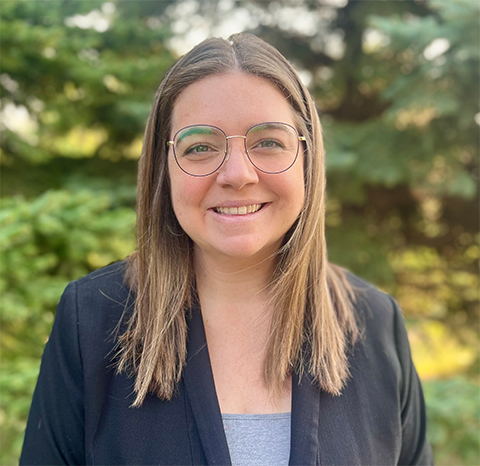Unraveling cancer’s spaghetti proteins
“I call them spaghetti noodles,” because they lack structure and are highly flexible, Katie Dunleavy said of intrinsically disorder proteins, or IDPs, her chosen field of study. She studied IDPs in more depth during her Ph.D. at the University of Florida, focusing on their conformational dynamics and hydration properties using a yeast protein as a model system.

Now a postdoctoral fellow at the University of Minnesota and former American Society for Biochemistry and Molecular Biology Maximizing Opportunities for Scientific and Academic Independent Careers, or MOSAIC, scholar, Dunleavy is studying how the IDP transcription factor c-MYC interacts with Aurora kinase A, or AURKA. c-MYC is expressed in over 70% of human cancers, making its interactions a vital focus for potential cancer therapies. Meanwhile, AURKA is a binding partner that may stabilize c-MYC.
Although AURKA’s role in stabilizing c-MYC is known, the precise structure and mechanism behind this stabilization remain unclear. This lack of understanding makes it difficult to design inhibitors that could disrupt the interaction and restore the normal protein turnover. Through a process called ubiquitination, the small protein ubiquitin tags other proteins, such as c-MYC, for degradation. To investigate how AURKA alters c-MYC’s ubiquitination process, Dunleavy is employing advanced biophysical techniques.
To investigate how AURKA affects the degradation of c-MYC, Dunleavy uses several biophysical techniques. For example, she uses continuous-wave electron paramagnetic resonance, or CW–EPR, to track protein movement in real time. She also applies X-ray crystallography and cryo-electron microscopy (cryo-EM) to map the structure of the c-MYC–AURKA complex and examine how their interaction may prevent c-MYC from being broken down. Ubiquitination assays further allow her to study how c-MYC is modified in the presence of AURKA. Together, these methods help her explore the mechanisms by which AURKA stabilizes c-MYC and interferes with its degradation.
“The hypothesis is that (when AURKA binds to c-MYC), the bound complex can’t be properly ubiquitinated nor sent for proper degradation of the protein,” Dunleavy said.
While researchers have known that AURKA binds to and stabilizes c-MYC, the full implications of that interaction are still coming into focus. “In a broader sense, this means the mechanism of stabilization of c-MYC by AURKA in cancerous conditions in general is not known,” she said.
Dunleavy is especially intrigued by what sets this project apart from more conventional studies of kinases. “What I find so cool about this story is that it is not a traditional kinase story,” she said. AURKA doesn’t modify c-MYC — it binds to c-Myc and protects it from degradation.
Because c-MYC is an intrinsically disordered protein, or IDP, it lacks well-defined binding pockets, making it a challenging drug target. Dunleavy plans to launch her independent research focused on defining the structure of the MYC–AURKA complexes and how ubiquitination alters their interaction. Her work could help build a structural and mechanistic roadmap — and inform strategies for disrupting this interaction. Once considered “undruggable,” IDPs like c-MYC may now be viable targets for cancer therapies. Receiving the MOSAIC award inspired Dunleavy, a first-generation college graduate, to give back.
“I was drawn to the MOSAIC program since I have a passion for mentorship and helping the underrepresented, including students who come from similar situations (as me) that don’t have a background (in science) or
don’t know that research exists,” Dunleavy said. “It has empowered me to grow my ambitions. I want to help inspire others through mentorship to be an available outlet for those pursuing this career.”
Enjoy reading ASBMB Today?
Become a member to receive the print edition four times a year and the digital edition monthly.
Learn moreGet the latest from ASBMB Today
Enter your email address, and we’ll send you a weekly email with recent articles, interviews and more.
Latest in People
People highlights or most popular articles

Building a career in nutrition across continents
Driven by past women in science, Kazi Sarjana Safain left Bangladesh and pursued a scientific career in the U.S.

Kiessling wins glycobiology award
She was honored by the Society for Glycobiology for her work on protein–glycan interactions.

2026 ASBMB election results
Meet the new Council members and Nominating Committee member.

Simcox wins SACNAS mentorship award
She was recognized for her sustained excellence in mentorship and was honored at SACNAS’ 2025 National Conference.

From humble beginnings to unlocking lysosomal secrets
Monther Abu–Remaileh will receive the ASBMB’s 2026 Walter A. Shaw Young Investigator Award in Lipid Research at the ASBMB Annual Meeting, March 7-10 in Washington, D.C.

Chemistry meets biology to thwart parasites
Margaret Phillips will receive the Alice and C. C. Wang Award in Molecular Parasitology at the ASBMB Annual Meeting, March 7-10 in Washington, D.C.

